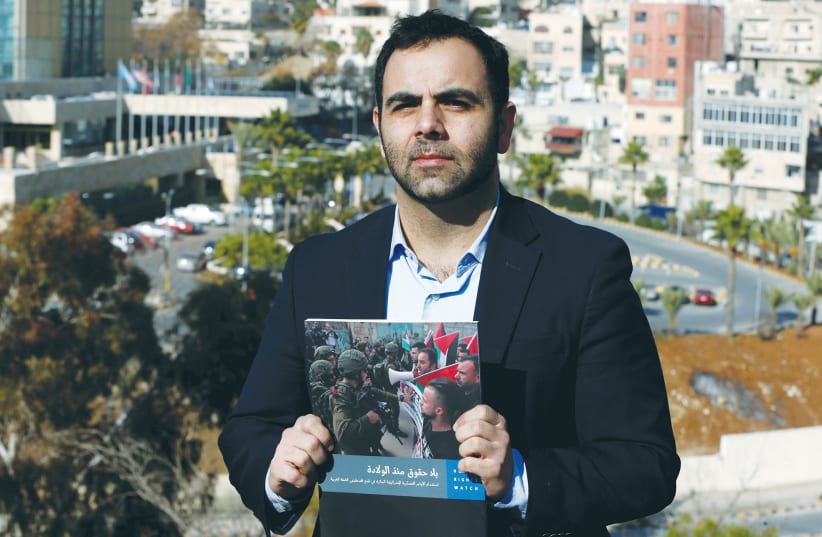The effort to demonize Israel through comparison to the heinous legacy of the South African apartheid regime has deep roots, going back to the Soviet and Arab campaigns of the 1970s, including the infamous UN resolution declaring that Zionism is a form of racism.
Although Human Rights Watch (HRW) claims that its latest contribution, A Threshold Crossed: Israeli Authorities and the Crimes of Apartheid and Persecution, is based on new material, a quick read reveals the same mix of shrill propaganda, false allegations, and legal distortions marketed by the NGO network for decades.
Omar Shakir, HRW’s “Israel and Palestine director,” is listed as the main author of the 217-page publication, which includes high-quality graphics and layout (with its $90 million budget, money is no object).
Shakir was hired in 2016, after a number of years as a campus activist under headings like ”Apartheid IsReal.” He led HRW’s (failed) effort to press Airbnb and the FIFA soccer association to join the anti-Israel boycott, and repeatedly invokes “apartheid” and “racism” when discussing Israel. For Shakir, who left Israel after his work visa was not renewed and a lengthy court battle, this is revenge propaganda.
In releasing this publication now, Shakir and HRW join numerous NGOs in amplifying the International Criminal Court prosecutor’s recent decision to open investigations of Israel for war crimes, including post-1967 settlements and occupation policies.
The text reiterates the main claims of a 700-page 2017 submission to the ICC from a group of NGOs (Al-Haq, PCHR, Al-Mezan, Al-Dameer) linked to the PFLP terror organization, alleging that “Israel persecutes the occupied Palestinian population and subjects them to the crimes of persecution and apartheid” and condemning what they call Israel’s effort to “ensure Israeli Jewish domination.” Other parts reproduce B’Tselem’s campaign, headlined: “A regime of Jewish supremacy from the Jordan River to the Mediterranean Sea: This is apartheid.
HRW allegations, also mirroring the other NGOs, exploit the inherent flexibility and political essence of international law, with claims based on far-fetched interpretation of the Rome Statute (the ICC’s foundation document). For example the HRW publication asserts that “Israel’s coercive policies… amount to intentional forcible transfer of civilians… a grave breach of the laws of war.” These phrases, each a distortion (or falsehood), are then pronounced to be “one of the kinds of inhumane acts that make up the crime of apartheid.”
By drawing a direct line to South Africa and labeling the Jewish state as inherently racist, the goal is to delegitimize the concept of Jewish sovereign equality, regardless of borders or policies. The South African regime was characterized by cruel and systematic, institutionalized dehumanization. In contrast, and notwithstanding the ongoing conflict, Israel’s non-Jewish citizens have full rights, including voting for Knesset representatives.
Worse, exploiting the “apartheid” image in the context of the Israeli-Palestinian conflict is a cynical appropriation of the suffering of the victims of the actual apartheid regime. Richard Goldstone, a former justice of the South African Constitutional Court, wrote that, “In Israel, there is no apartheid. Nothing there comes close to the definition of apartheid under the 1998 Rome Statute.... It is an unfair and inaccurate slander against Israel.”
Beyond South Africa, no other regime or government has been deemed to meet the international definition of apartheid, not even murderous and oppressive regimes practicing separation based on race, religion, and gender such as Saudi Arabia and China.
In pursuing this 20-year campaign, HRW, led by Kenneth Roth, has continuously invoked the “Israel apartheid” theme, including playing a central role in the notoriously antisemitic NGO Forum at the 2001 UN Durban conference. The final declaration referred to Israel and apartheid repeatedly, and called for the “complete international isolation of Israel as an apartheid state.”
After members of HRW’s board criticized this involvement, Roth replied cynically: “Clearly Israeli racist practices are an appropriate topic.” Roth and other top officials have repeated the apartheid and racist smears frequently since then. In one of many examples, in the context of the 2017 white supremacist march and violence in Charlottesville, Roth tweeted a link to a propaganda piece headlined “Birds of a feather: White supremacy and Zionism.” He included a picture depicting a Confederate and Israeli flag, commenting, “Many rights activists condemn Israeli abuse & antisemitism. Some white supremacists embrace Israel & antisemitism.”
A major addition to the usual allegations is that the planned annexation of parts of the West Bank controlled by Israel under the Oslo framework (the strategic and sparsely populated Area C) constitutes apartheid (repeated 32 times in the HRW text). Indeed, at the time when Israeli officials made such statements, HRW and the NGOs issued a wave of apartheid condemnations. Now, even though the annexation was dropped, the condemnations remain, again demonstrating the centrality of slogans over substance.
In 2009, HRW founder Robert Bernstein, writing in The New York Times, took on his organization, criticizing the leaders for losing their moral compass, and “issuing reports on the Israeli-Arab conflict that are helping those who wish to turn Israel into a pariah state.” Many years later, and with much larger budgets and visibility, the organization’s delegitimization continues.
The writer is emeritus professor of political science at Bar-Ilan University, and heads the Institute for NGO Research in Jerusalem.
